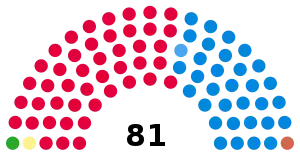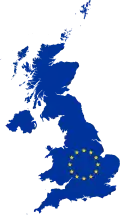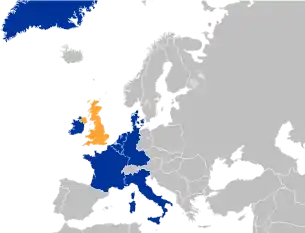1989 European Parliament election in the United Kingdom
The European Parliament Election, 1989, was the third European election to be held in the United Kingdom. It was held on 15 June. The electoral system was First Past the Post in England, Scotland and Wales and Single Transferable Vote in Northern Ireland. The turnout was again the lowest in Europe.
| ||||||||||||||||||||||||||||||||||
81 seats to the European Parliament | ||||||||||||||||||||||||||||||||||
|---|---|---|---|---|---|---|---|---|---|---|---|---|---|---|---|---|---|---|---|---|---|---|---|---|---|---|---|---|---|---|---|---|---|---|
| Turnout | 36.4% ( | |||||||||||||||||||||||||||||||||
| ||||||||||||||||||||||||||||||||||
.svg.png.webp) Colours denote the winning party, as shown in the main table of results. | ||||||||||||||||||||||||||||||||||
 | ||||||||||||||||||||||||||||||||||
| ||||||||||||||||||||||||||||||||||
| Part of a series of articles on |
| UK membership of the European Union (1973-2020) |
|---|
 |
|
|
This election saw the best performance ever by the Green Party (UK) (formerly the Ecology Party), collecting over 2 million votes and 15% of the vote share. It had only received 70,853 as the Ecology Party in the previous election. However, because of First Past the Post system, the Green Party did not gain a single MEP, while the Scottish National Party received 1 seat with only 3% of the vote share. The Green Party's vote total of 2,299,287 remains its best performance in a national election, as does its percentage result of 14.5%.
The election also saw Labour overtake the Conservatives for the first time in any election since October 1974 and the first time ever in a European election, winning 13 more seats.
Results
United Kingdom
| Party | Votes won[1] | % of vote | Loss/Gain | Seats | % of seats | Loss/Gain | |
|---|---|---|---|---|---|---|---|
| Labour | 6,153,661 | 38.7 | 45 | 55.6 | |||
| Conservative | 5,356,887 | 33.7 | 32 | 39.5 | |||
| Green | 2,299,287 | 14.5 | 0 | ||||
| SLD | 944,861 | 5.9 | 0 | ||||
| SNP | 406,686 | 2.6 | 1 | 1.2 | |||
| DUP | 160,110 | 1.0 | 1 | 1.2 | |||
| SDLP | 136,335 | 0.9 | 1 | 1.2 | |||
| UUP | 118,785 | 0.7 | 1 | 1.2 | |||
| Plaid Cymru | 115,062 | 0.7 | 0 | ||||
| SDP | 75,886 | 0.5 | New | 0 | |||
| Sinn Féin | 48,914 | 0.3 | 0 | ||||
| Alliance | 27,905 | 0.2 | 0 | ||||
| Independent | 12,724 | 0.1 | 0 | ||||
| Ind. Conservative | 6,996 | 0.0 | 0 | ||||
| Workers' Party | 5,590 | 0.0 | 0 | ||||
| Labour Representation Group | 3,540 | 0.0 | New | 0 | |||
| Communist | 4,420 | 0.0 | New | 0 | |||
| Monster Raving Loony | 4,263 | 0.0 | New | 0 | |||
| Mebyon Kernow | 4,224 | 0.0 | New | 0 | |||
| Wessex Regionalist | 2,332 | 0.0 | 0 | ||||
| International Communist | 1,567 | 0.0 | New | 0 | |||
| National Front | 1,471 | 0.0 | New | 0 | |||
| Humanist | 1,349 | 0.0 | New | 0 | |||
| Labour Party NI | 1,274 | 0.0 | New | 0 | |||
| Socialist (GB) | 919 | 0.0 | New | 0 | |||
| Corrective | 707 | 0.0 | New | 0 | |||
| Communist League | 323 | 0.0 | New | 0 | |||
- Overall (England, Scotland, Wales and Northern Ireland) turnout: 36% (EU average: 59%)
- Overall votes cast: 15,896,078
Great Britain
| Party | Votes won[1] | % of vote | Loss/Gain | Seats | % of seats | Loss/Gain | |
|---|---|---|---|---|---|---|---|
| Labour | 6,153,661 | 40.1 | 45 | 57.7 | |||
| Conservative | 5,331,098 | 34.7 | 32 | 41.0 | |||
| Green | 2,292,718 | 14.9 | 0 | ||||
| SLD | 944,861 | 6.2 | 0 | ||||
| SNP | 406,686 | 2.6 | 1 | 1.3 | |||
| Plaid Cymru | 115,062 | 0.7 | 0 | ||||
| SDP | 75,886 | 0.5 | New | 0 | |||
| Independent | 12,724 | 0.1 | 0 | ||||
| Ind. Conservative | 6,996 | 0.0 | 0 | ||||
| Communist | 4,420 | 0.0 | New | 0 | |||
| Monster Raving Loony | 4,263 | 0.0 | New | 0 | |||
| Mebyon Kernow | 4,224 | 0.0 | New | 0 | |||
| Wessex Regionalist | 2,332 | 0.0 | 0 | ||||
| International Communist | 1,567 | 0.0 | New | 0 | |||
| National Front | 1,471 | 0.0 | New | 0 | |||
| Humanist | 1,349 | 0.0 | New | 0 | |||
| Socialist (GB) | 919 | 0.0 | New | 0 | |||
| Corrective | 707 | 0.0 | New | 0 | |||
| Communist League | 323 | 0.0 | New | 0 | |||
Total votes cast: 15,361,267
Northern Ireland
| Party | Candidate(s) | Seats | Loss/Gain | First Preference Votes[2] | |||
|---|---|---|---|---|---|---|---|
| Number | % of vote | ||||||
| DUP | Ian Paisley | 1 | 0 | 160,110 | 29.9 | ||
| SDLP | John Hume | 1 | 0 | 136,335 | 25.5 | ||
| UUP | Jim Nicholson | 1 | 0 | 118,785 | 22.2 | ||
| Sinn Féin | Danny Morrison | 0 | 0 | 48,914 | 9.1 | ||
| Alliance | John Alderdice | 0 | 0 | 27,905 | 5.2 | ||
| NI Conservatives | Myrtle Boal | 0 | 0 | 25,789 | 4.8 | ||
| Green | Malcolm Samuel | 0 | 0 | 6,569 | 1.0 | ||
| Workers' Party | Seamus Lynch | 0 | 0 | 5,590 | 1 | ||
| Labour Representation | Mark Langhammer | 0 | 0 | 3,540 | 0 | ||
| Labour '87 | Brian Caul | 0 | 0 | 1,274 | 0 | ||
Total votes cast – 534,811.
Party Leaders in 1989
- Labour – Neil Kinnock
- Conservative – Margaret Thatcher
- Green – N/A (the Green Party did not have a leader)
- Liberal Democrat – Paddy Ashdown
- SNP – Gordon Wilson
- Plaid Cymru – Dafydd Elis Thomas
- DUP – Ian Paisley
- SDLP – John Hume
- UUP – James Molyneaux
See also
References
- "European Parliament elections: 1979 to 1994". House of Commons Library.
- http://www.parliament.uk/briefing-papersRP99-57.pdf
.jpg.webp)
.jpg.webp)
